Qantas Tax Avoidance: A Financial Accounting Theory Perspective
VerifiedAdded on 2023/06/12
|19
|5121
|412
Essay
AI Summary
This paper explores tax avoidance by large corporations in Australia, specifically focusing on Qantas Airways' operations. It highlights how generous tax concessions, depreciation provisions, and loss offsetting contribute to this phenomenon. The study employs legitimacy theory and stakeholder theory to explain tax evasion and related CSR issues. It provides a historical overview of these theories, discussing their advantages, disadvantages, and application to the case of Qantas. The paper also delves into the media attention surrounding corporate tax avoidance and the implications for corporate social responsibility, especially when companies engage in both CSR activities and tax avoidance strategies. It emphasizes the conflict between these actions and their impact on various stakeholders, including shareholders, tax authorities, and the community.
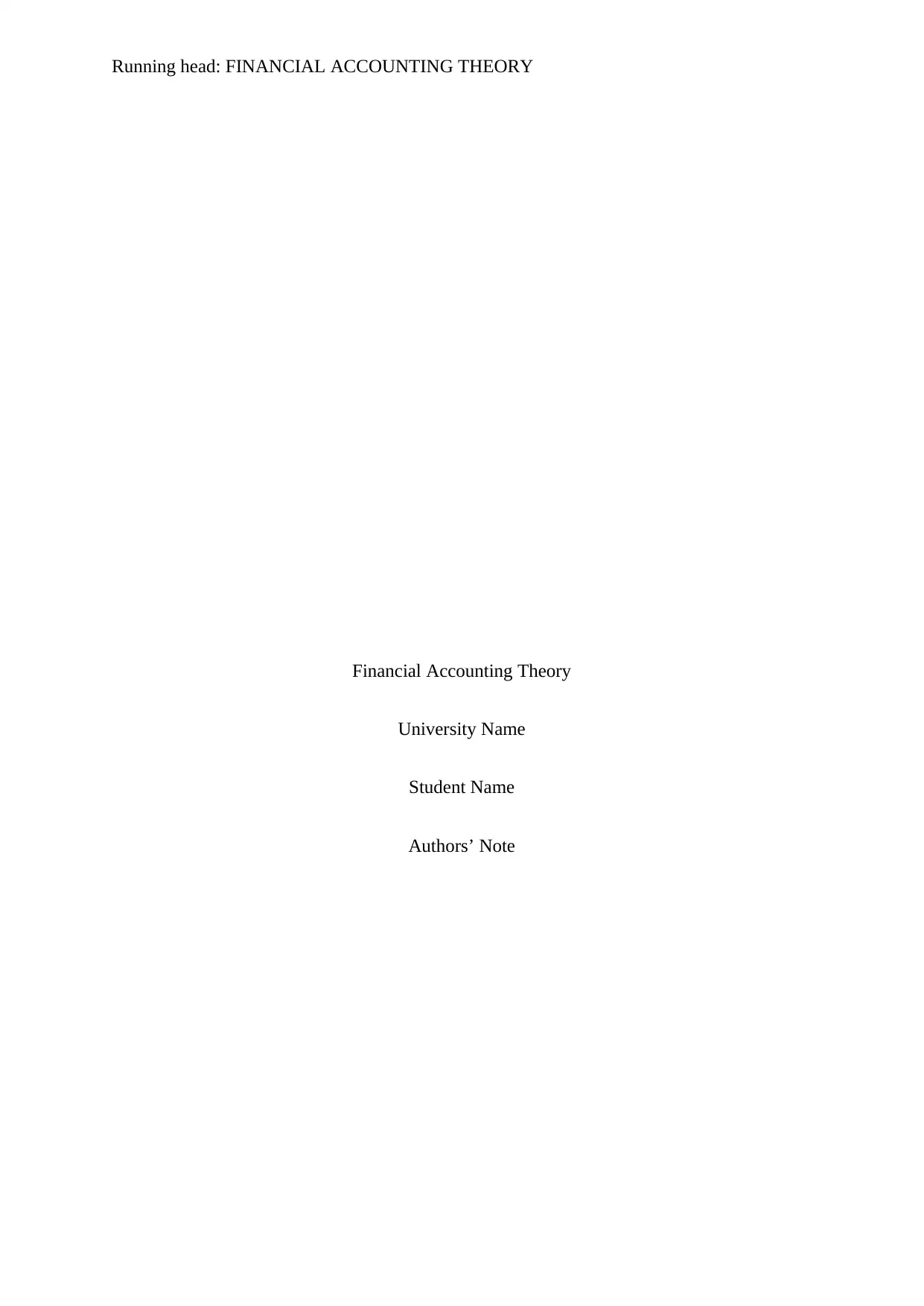
Running head: FINANCIAL ACCOUNTING THEORY
Financial Accounting Theory
University Name
Student Name
Authors’ Note
Financial Accounting Theory
University Name
Student Name
Authors’ Note
Paraphrase This Document
Need a fresh take? Get an instant paraphrase of this document with our AI Paraphraser
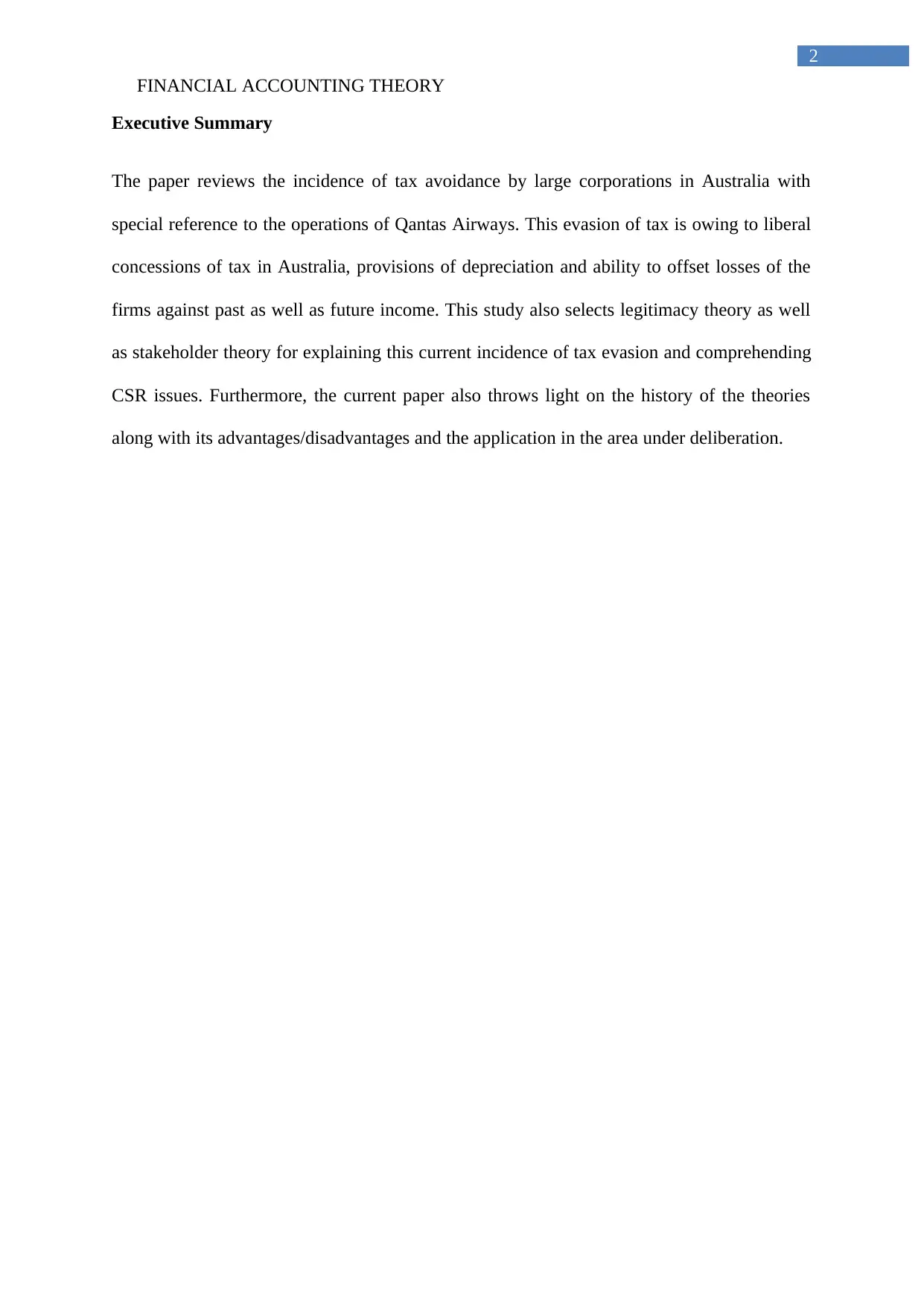
2
FINANCIAL ACCOUNTING THEORY
Executive Summary
The paper reviews the incidence of tax avoidance by large corporations in Australia with
special reference to the operations of Qantas Airways. This evasion of tax is owing to liberal
concessions of tax in Australia, provisions of depreciation and ability to offset losses of the
firms against past as well as future income. This study also selects legitimacy theory as well
as stakeholder theory for explaining this current incidence of tax evasion and comprehending
CSR issues. Furthermore, the current paper also throws light on the history of the theories
along with its advantages/disadvantages and the application in the area under deliberation.
FINANCIAL ACCOUNTING THEORY
Executive Summary
The paper reviews the incidence of tax avoidance by large corporations in Australia with
special reference to the operations of Qantas Airways. This evasion of tax is owing to liberal
concessions of tax in Australia, provisions of depreciation and ability to offset losses of the
firms against past as well as future income. This study also selects legitimacy theory as well
as stakeholder theory for explaining this current incidence of tax evasion and comprehending
CSR issues. Furthermore, the current paper also throws light on the history of the theories
along with its advantages/disadvantages and the application in the area under deliberation.
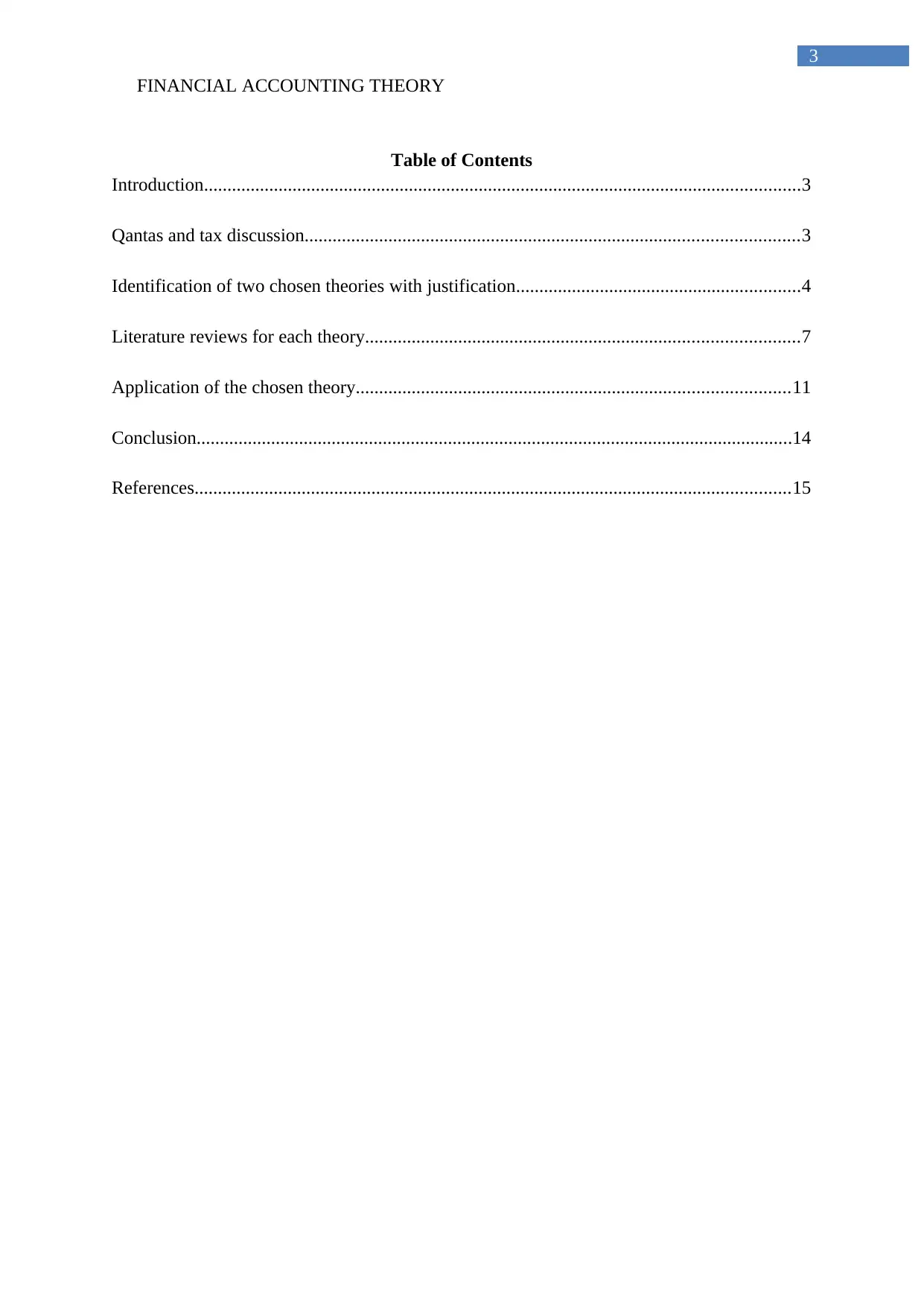
3
FINANCIAL ACCOUNTING THEORY
Table of Contents
Introduction................................................................................................................................3
Qantas and tax discussion..........................................................................................................3
Identification of two chosen theories with justification.............................................................4
Literature reviews for each theory.............................................................................................7
Application of the chosen theory.............................................................................................11
Conclusion................................................................................................................................14
References................................................................................................................................15
FINANCIAL ACCOUNTING THEORY
Table of Contents
Introduction................................................................................................................................3
Qantas and tax discussion..........................................................................................................3
Identification of two chosen theories with justification.............................................................4
Literature reviews for each theory.............................................................................................7
Application of the chosen theory.............................................................................................11
Conclusion................................................................................................................................14
References................................................................................................................................15
⊘ This is a preview!⊘
Do you want full access?
Subscribe today to unlock all pages.

Trusted by 1+ million students worldwide
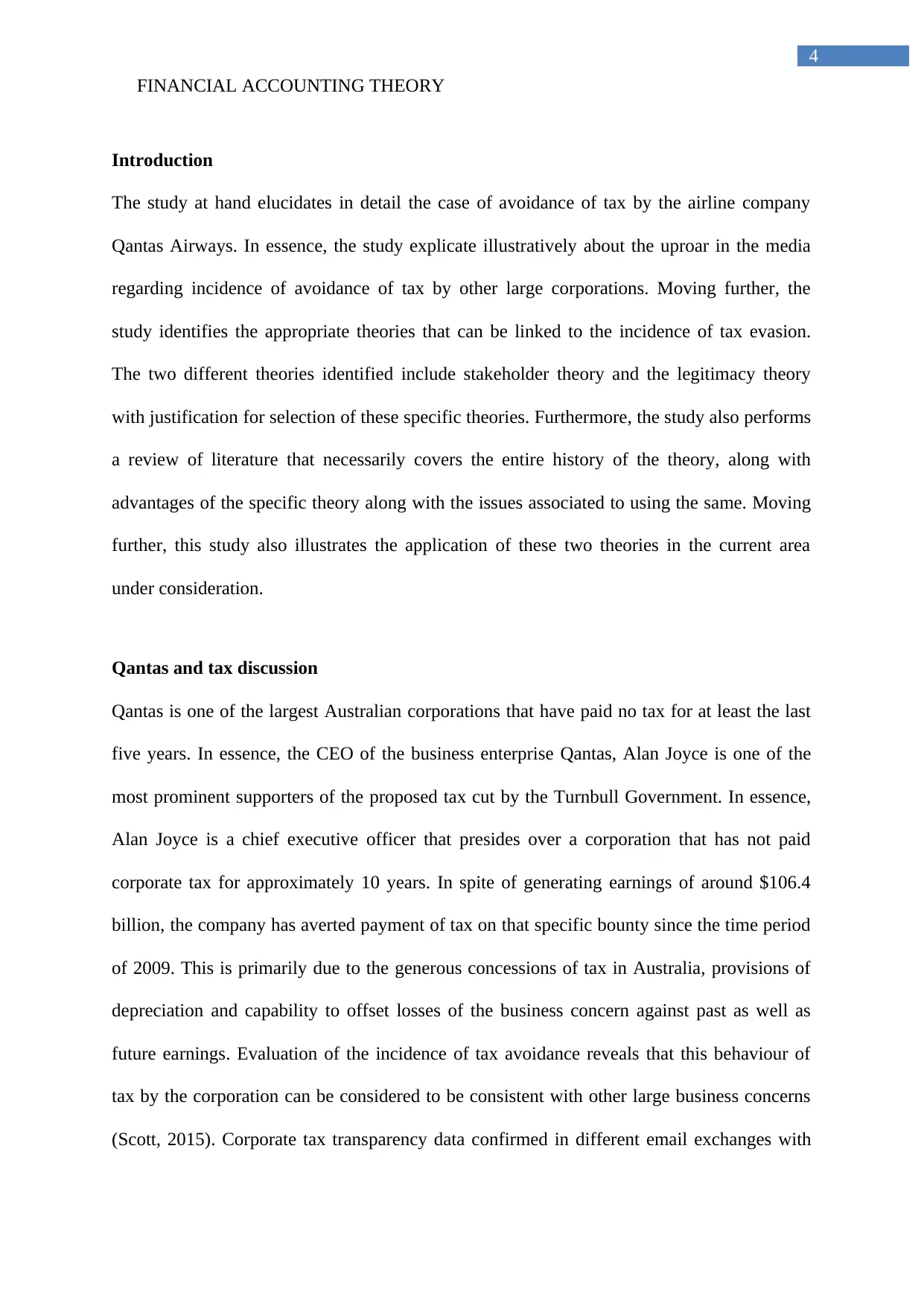
4
FINANCIAL ACCOUNTING THEORY
Introduction
The study at hand elucidates in detail the case of avoidance of tax by the airline company
Qantas Airways. In essence, the study explicate illustratively about the uproar in the media
regarding incidence of avoidance of tax by other large corporations. Moving further, the
study identifies the appropriate theories that can be linked to the incidence of tax evasion.
The two different theories identified include stakeholder theory and the legitimacy theory
with justification for selection of these specific theories. Furthermore, the study also performs
a review of literature that necessarily covers the entire history of the theory, along with
advantages of the specific theory along with the issues associated to using the same. Moving
further, this study also illustrates the application of these two theories in the current area
under consideration.
Qantas and tax discussion
Qantas is one of the largest Australian corporations that have paid no tax for at least the last
five years. In essence, the CEO of the business enterprise Qantas, Alan Joyce is one of the
most prominent supporters of the proposed tax cut by the Turnbull Government. In essence,
Alan Joyce is a chief executive officer that presides over a corporation that has not paid
corporate tax for approximately 10 years. In spite of generating earnings of around $106.4
billion, the company has averted payment of tax on that specific bounty since the time period
of 2009. This is primarily due to the generous concessions of tax in Australia, provisions of
depreciation and capability to offset losses of the business concern against past as well as
future earnings. Evaluation of the incidence of tax avoidance reveals that this behaviour of
tax by the corporation can be considered to be consistent with other large business concerns
(Scott, 2015). Corporate tax transparency data confirmed in different email exchanges with
FINANCIAL ACCOUNTING THEORY
Introduction
The study at hand elucidates in detail the case of avoidance of tax by the airline company
Qantas Airways. In essence, the study explicate illustratively about the uproar in the media
regarding incidence of avoidance of tax by other large corporations. Moving further, the
study identifies the appropriate theories that can be linked to the incidence of tax evasion.
The two different theories identified include stakeholder theory and the legitimacy theory
with justification for selection of these specific theories. Furthermore, the study also performs
a review of literature that necessarily covers the entire history of the theory, along with
advantages of the specific theory along with the issues associated to using the same. Moving
further, this study also illustrates the application of these two theories in the current area
under consideration.
Qantas and tax discussion
Qantas is one of the largest Australian corporations that have paid no tax for at least the last
five years. In essence, the CEO of the business enterprise Qantas, Alan Joyce is one of the
most prominent supporters of the proposed tax cut by the Turnbull Government. In essence,
Alan Joyce is a chief executive officer that presides over a corporation that has not paid
corporate tax for approximately 10 years. In spite of generating earnings of around $106.4
billion, the company has averted payment of tax on that specific bounty since the time period
of 2009. This is primarily due to the generous concessions of tax in Australia, provisions of
depreciation and capability to offset losses of the business concern against past as well as
future earnings. Evaluation of the incidence of tax avoidance reveals that this behaviour of
tax by the corporation can be considered to be consistent with other large business concerns
(Scott, 2015). Corporate tax transparency data confirmed in different email exchanges with
Paraphrase This Document
Need a fresh take? Get an instant paraphrase of this document with our AI Paraphraser
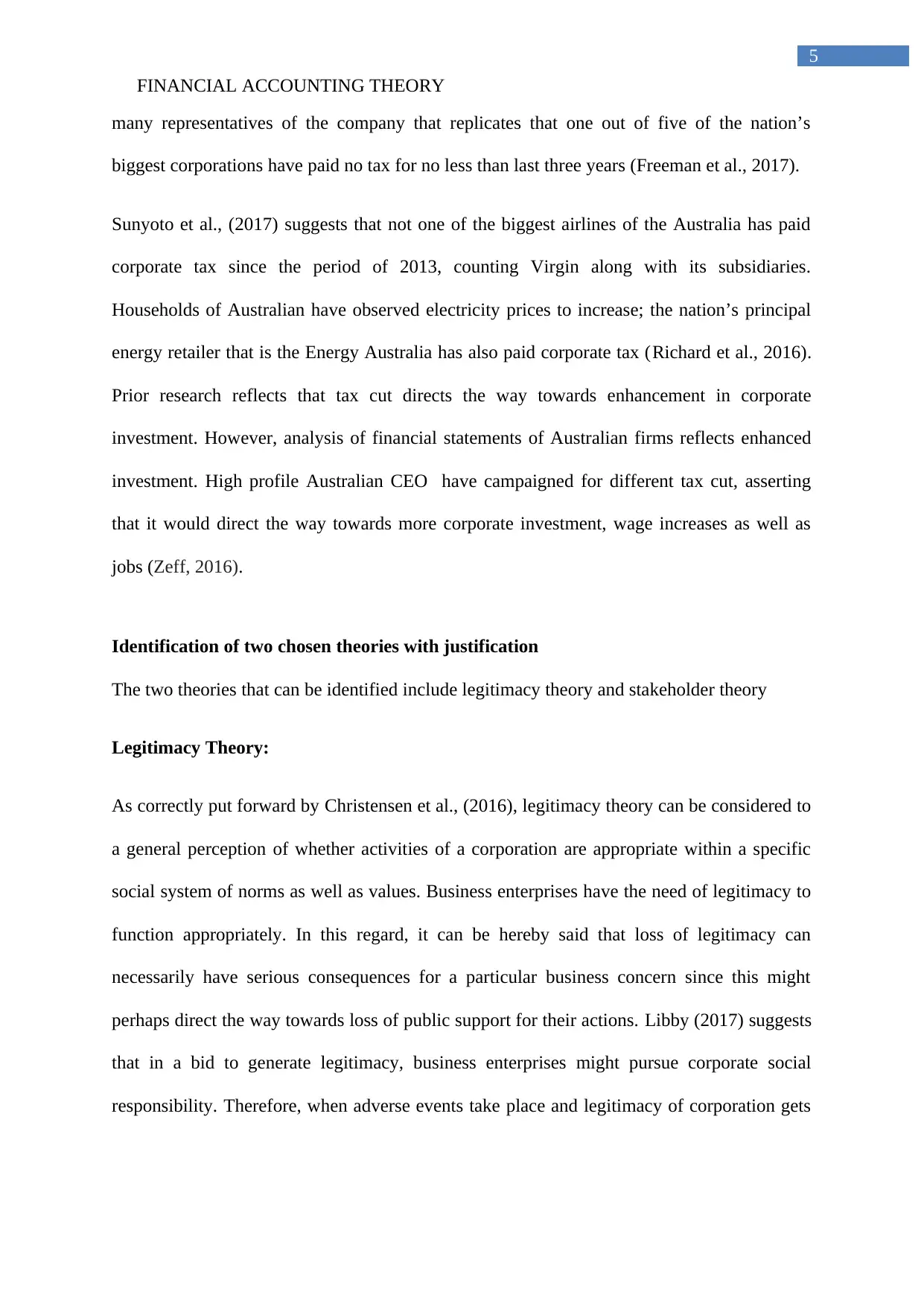
5
FINANCIAL ACCOUNTING THEORY
many representatives of the company that replicates that one out of five of the nation’s
biggest corporations have paid no tax for no less than last three years (Freeman et al., 2017).
Sunyoto et al., (2017) suggests that not one of the biggest airlines of the Australia has paid
corporate tax since the period of 2013, counting Virgin along with its subsidiaries.
Households of Australian have observed electricity prices to increase; the nation’s principal
energy retailer that is the Energy Australia has also paid corporate tax (Richard et al., 2016).
Prior research reflects that tax cut directs the way towards enhancement in corporate
investment. However, analysis of financial statements of Australian firms reflects enhanced
investment. High profile Australian CEO have campaigned for different tax cut, asserting
that it would direct the way towards more corporate investment, wage increases as well as
jobs (Zeff, 2016).
Identification of two chosen theories with justification
The two theories that can be identified include legitimacy theory and stakeholder theory
Legitimacy Theory:
As correctly put forward by Christensen et al., (2016), legitimacy theory can be considered to
a general perception of whether activities of a corporation are appropriate within a specific
social system of norms as well as values. Business enterprises have the need of legitimacy to
function appropriately. In this regard, it can be hereby said that loss of legitimacy can
necessarily have serious consequences for a particular business concern since this might
perhaps direct the way towards loss of public support for their actions. Libby (2017) suggests
that in a bid to generate legitimacy, business enterprises might pursue corporate social
responsibility. Therefore, when adverse events take place and legitimacy of corporation gets
FINANCIAL ACCOUNTING THEORY
many representatives of the company that replicates that one out of five of the nation’s
biggest corporations have paid no tax for no less than last three years (Freeman et al., 2017).
Sunyoto et al., (2017) suggests that not one of the biggest airlines of the Australia has paid
corporate tax since the period of 2013, counting Virgin along with its subsidiaries.
Households of Australian have observed electricity prices to increase; the nation’s principal
energy retailer that is the Energy Australia has also paid corporate tax (Richard et al., 2016).
Prior research reflects that tax cut directs the way towards enhancement in corporate
investment. However, analysis of financial statements of Australian firms reflects enhanced
investment. High profile Australian CEO have campaigned for different tax cut, asserting
that it would direct the way towards more corporate investment, wage increases as well as
jobs (Zeff, 2016).
Identification of two chosen theories with justification
The two theories that can be identified include legitimacy theory and stakeholder theory
Legitimacy Theory:
As correctly put forward by Christensen et al., (2016), legitimacy theory can be considered to
a general perception of whether activities of a corporation are appropriate within a specific
social system of norms as well as values. Business enterprises have the need of legitimacy to
function appropriately. In this regard, it can be hereby said that loss of legitimacy can
necessarily have serious consequences for a particular business concern since this might
perhaps direct the way towards loss of public support for their actions. Libby (2017) suggests
that in a bid to generate legitimacy, business enterprises might pursue corporate social
responsibility. Therefore, when adverse events take place and legitimacy of corporation gets
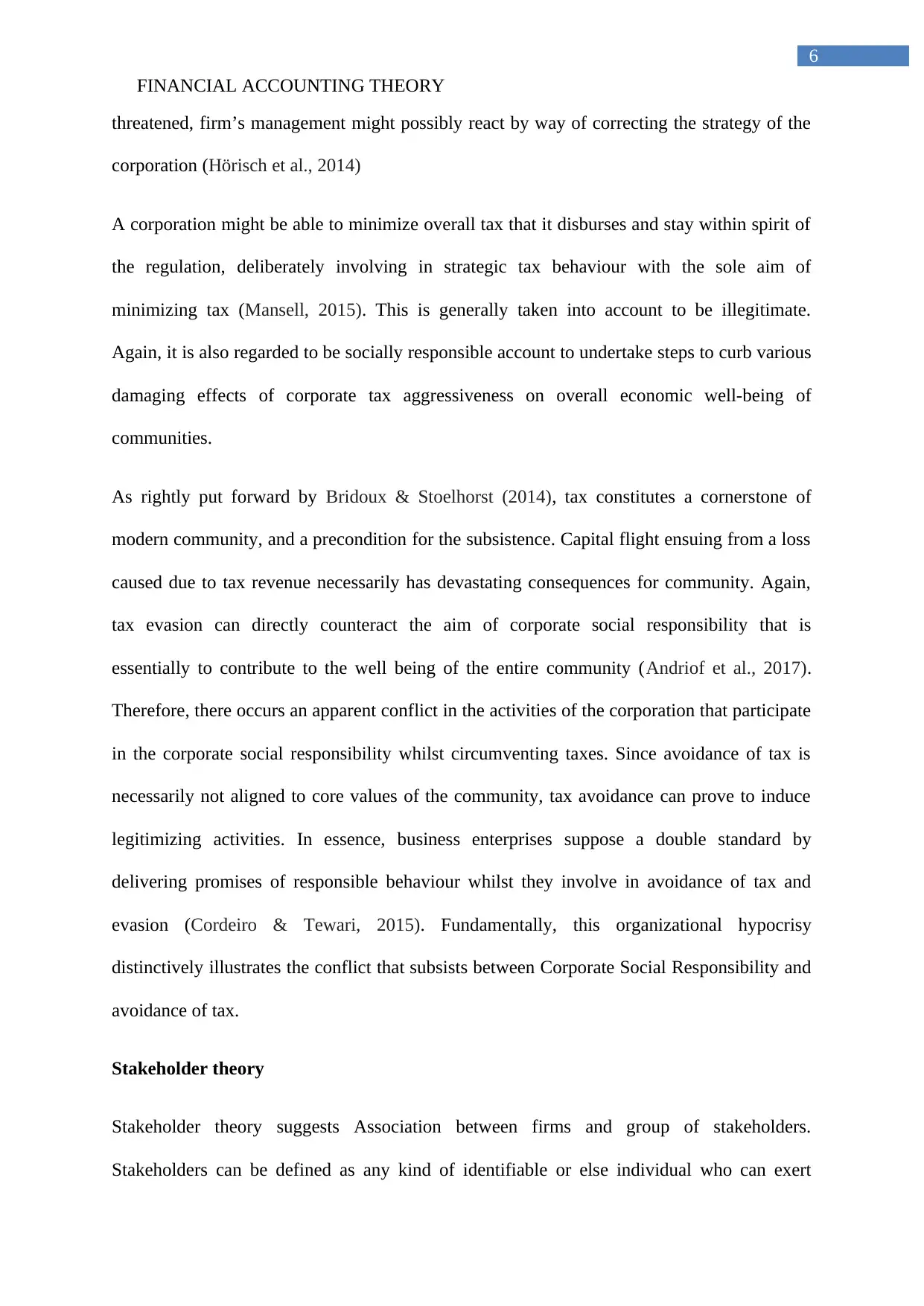
6
FINANCIAL ACCOUNTING THEORY
threatened, firm’s management might possibly react by way of correcting the strategy of the
corporation (Hörisch et al., 2014)
A corporation might be able to minimize overall tax that it disburses and stay within spirit of
the regulation, deliberately involving in strategic tax behaviour with the sole aim of
minimizing tax (Mansell, 2015). This is generally taken into account to be illegitimate.
Again, it is also regarded to be socially responsible account to undertake steps to curb various
damaging effects of corporate tax aggressiveness on overall economic well-being of
communities.
As rightly put forward by Bridoux & Stoelhorst (2014), tax constitutes a cornerstone of
modern community, and a precondition for the subsistence. Capital flight ensuing from a loss
caused due to tax revenue necessarily has devastating consequences for community. Again,
tax evasion can directly counteract the aim of corporate social responsibility that is
essentially to contribute to the well being of the entire community (Andriof et al., 2017).
Therefore, there occurs an apparent conflict in the activities of the corporation that participate
in the corporate social responsibility whilst circumventing taxes. Since avoidance of tax is
necessarily not aligned to core values of the community, tax avoidance can prove to induce
legitimizing activities. In essence, business enterprises suppose a double standard by
delivering promises of responsible behaviour whilst they involve in avoidance of tax and
evasion (Cordeiro & Tewari, 2015). Fundamentally, this organizational hypocrisy
distinctively illustrates the conflict that subsists between Corporate Social Responsibility and
avoidance of tax.
Stakeholder theory
Stakeholder theory suggests Association between firms and group of stakeholders.
Stakeholders can be defined as any kind of identifiable or else individual who can exert
FINANCIAL ACCOUNTING THEORY
threatened, firm’s management might possibly react by way of correcting the strategy of the
corporation (Hörisch et al., 2014)
A corporation might be able to minimize overall tax that it disburses and stay within spirit of
the regulation, deliberately involving in strategic tax behaviour with the sole aim of
minimizing tax (Mansell, 2015). This is generally taken into account to be illegitimate.
Again, it is also regarded to be socially responsible account to undertake steps to curb various
damaging effects of corporate tax aggressiveness on overall economic well-being of
communities.
As rightly put forward by Bridoux & Stoelhorst (2014), tax constitutes a cornerstone of
modern community, and a precondition for the subsistence. Capital flight ensuing from a loss
caused due to tax revenue necessarily has devastating consequences for community. Again,
tax evasion can directly counteract the aim of corporate social responsibility that is
essentially to contribute to the well being of the entire community (Andriof et al., 2017).
Therefore, there occurs an apparent conflict in the activities of the corporation that participate
in the corporate social responsibility whilst circumventing taxes. Since avoidance of tax is
necessarily not aligned to core values of the community, tax avoidance can prove to induce
legitimizing activities. In essence, business enterprises suppose a double standard by
delivering promises of responsible behaviour whilst they involve in avoidance of tax and
evasion (Cordeiro & Tewari, 2015). Fundamentally, this organizational hypocrisy
distinctively illustrates the conflict that subsists between Corporate Social Responsibility and
avoidance of tax.
Stakeholder theory
Stakeholder theory suggests Association between firms and group of stakeholders.
Stakeholders can be defined as any kind of identifiable or else individual who can exert
⊘ This is a preview!⊘
Do you want full access?
Subscribe today to unlock all pages.

Trusted by 1+ million students worldwide
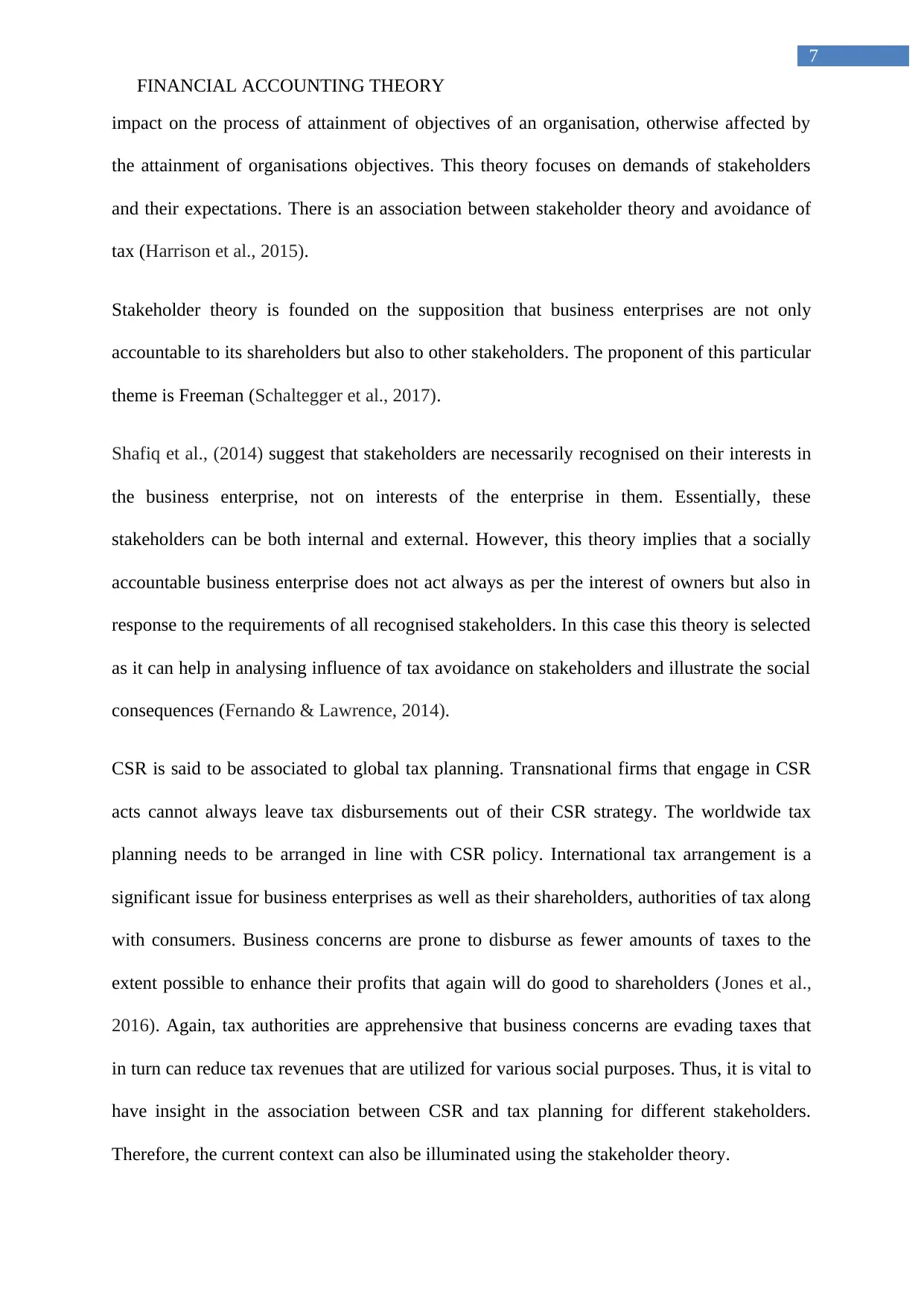
7
FINANCIAL ACCOUNTING THEORY
impact on the process of attainment of objectives of an organisation, otherwise affected by
the attainment of organisations objectives. This theory focuses on demands of stakeholders
and their expectations. There is an association between stakeholder theory and avoidance of
tax (Harrison et al., 2015).
Stakeholder theory is founded on the supposition that business enterprises are not only
accountable to its shareholders but also to other stakeholders. The proponent of this particular
theme is Freeman (Schaltegger et al., 2017).
Shafiq et al., (2014) suggest that stakeholders are necessarily recognised on their interests in
the business enterprise, not on interests of the enterprise in them. Essentially, these
stakeholders can be both internal and external. However, this theory implies that a socially
accountable business enterprise does not act always as per the interest of owners but also in
response to the requirements of all recognised stakeholders. In this case this theory is selected
as it can help in analysing influence of tax avoidance on stakeholders and illustrate the social
consequences (Fernando & Lawrence, 2014).
CSR is said to be associated to global tax planning. Transnational firms that engage in CSR
acts cannot always leave tax disbursements out of their CSR strategy. The worldwide tax
planning needs to be arranged in line with CSR policy. International tax arrangement is a
significant issue for business enterprises as well as their shareholders, authorities of tax along
with consumers. Business concerns are prone to disburse as fewer amounts of taxes to the
extent possible to enhance their profits that again will do good to shareholders (Jones et al.,
2016). Again, tax authorities are apprehensive that business concerns are evading taxes that
in turn can reduce tax revenues that are utilized for various social purposes. Thus, it is vital to
have insight in the association between CSR and tax planning for different stakeholders.
Therefore, the current context can also be illuminated using the stakeholder theory.
FINANCIAL ACCOUNTING THEORY
impact on the process of attainment of objectives of an organisation, otherwise affected by
the attainment of organisations objectives. This theory focuses on demands of stakeholders
and their expectations. There is an association between stakeholder theory and avoidance of
tax (Harrison et al., 2015).
Stakeholder theory is founded on the supposition that business enterprises are not only
accountable to its shareholders but also to other stakeholders. The proponent of this particular
theme is Freeman (Schaltegger et al., 2017).
Shafiq et al., (2014) suggest that stakeholders are necessarily recognised on their interests in
the business enterprise, not on interests of the enterprise in them. Essentially, these
stakeholders can be both internal and external. However, this theory implies that a socially
accountable business enterprise does not act always as per the interest of owners but also in
response to the requirements of all recognised stakeholders. In this case this theory is selected
as it can help in analysing influence of tax avoidance on stakeholders and illustrate the social
consequences (Fernando & Lawrence, 2014).
CSR is said to be associated to global tax planning. Transnational firms that engage in CSR
acts cannot always leave tax disbursements out of their CSR strategy. The worldwide tax
planning needs to be arranged in line with CSR policy. International tax arrangement is a
significant issue for business enterprises as well as their shareholders, authorities of tax along
with consumers. Business concerns are prone to disburse as fewer amounts of taxes to the
extent possible to enhance their profits that again will do good to shareholders (Jones et al.,
2016). Again, tax authorities are apprehensive that business concerns are evading taxes that
in turn can reduce tax revenues that are utilized for various social purposes. Thus, it is vital to
have insight in the association between CSR and tax planning for different stakeholders.
Therefore, the current context can also be illuminated using the stakeholder theory.
Paraphrase This Document
Need a fresh take? Get an instant paraphrase of this document with our AI Paraphraser
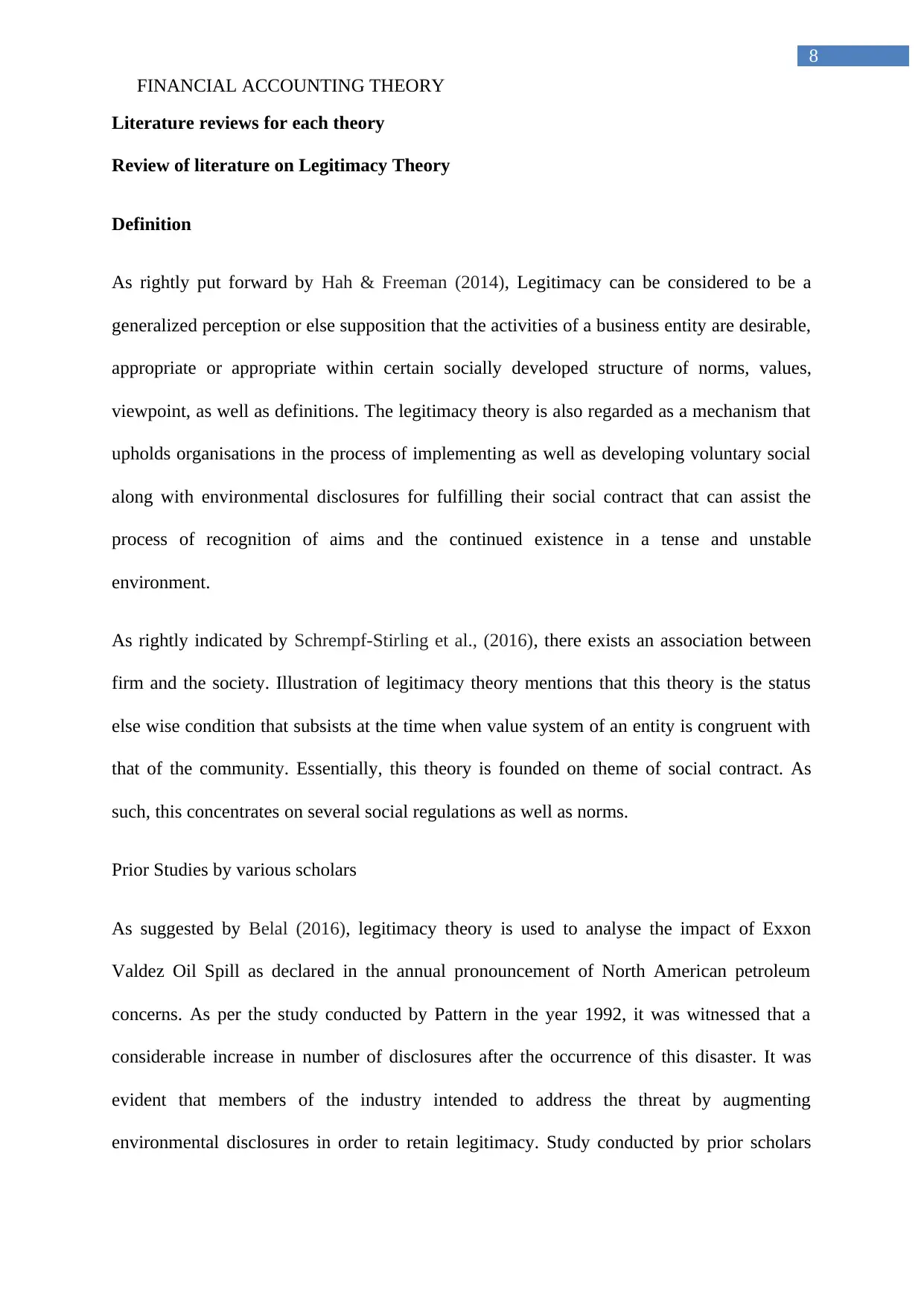
8
FINANCIAL ACCOUNTING THEORY
Literature reviews for each theory
Review of literature on Legitimacy Theory
Definition
As rightly put forward by Hah & Freeman (2014), Legitimacy can be considered to be a
generalized perception or else supposition that the activities of a business entity are desirable,
appropriate or appropriate within certain socially developed structure of norms, values,
viewpoint, as well as definitions. The legitimacy theory is also regarded as a mechanism that
upholds organisations in the process of implementing as well as developing voluntary social
along with environmental disclosures for fulfilling their social contract that can assist the
process of recognition of aims and the continued existence in a tense and unstable
environment.
As rightly indicated by Schrempf-Stirling et al., (2016), there exists an association between
firm and the society. Illustration of legitimacy theory mentions that this theory is the status
else wise condition that subsists at the time when value system of an entity is congruent with
that of the community. Essentially, this theory is founded on theme of social contract. As
such, this concentrates on several social regulations as well as norms.
Prior Studies by various scholars
As suggested by Belal (2016), legitimacy theory is used to analyse the impact of Exxon
Valdez Oil Spill as declared in the annual pronouncement of North American petroleum
concerns. As per the study conducted by Pattern in the year 1992, it was witnessed that a
considerable increase in number of disclosures after the occurrence of this disaster. It was
evident that members of the industry intended to address the threat by augmenting
environmental disclosures in order to retain legitimacy. Study conducted by prior scholars
FINANCIAL ACCOUNTING THEORY
Literature reviews for each theory
Review of literature on Legitimacy Theory
Definition
As rightly put forward by Hah & Freeman (2014), Legitimacy can be considered to be a
generalized perception or else supposition that the activities of a business entity are desirable,
appropriate or appropriate within certain socially developed structure of norms, values,
viewpoint, as well as definitions. The legitimacy theory is also regarded as a mechanism that
upholds organisations in the process of implementing as well as developing voluntary social
along with environmental disclosures for fulfilling their social contract that can assist the
process of recognition of aims and the continued existence in a tense and unstable
environment.
As rightly indicated by Schrempf-Stirling et al., (2016), there exists an association between
firm and the society. Illustration of legitimacy theory mentions that this theory is the status
else wise condition that subsists at the time when value system of an entity is congruent with
that of the community. Essentially, this theory is founded on theme of social contract. As
such, this concentrates on several social regulations as well as norms.
Prior Studies by various scholars
As suggested by Belal (2016), legitimacy theory is used to analyse the impact of Exxon
Valdez Oil Spill as declared in the annual pronouncement of North American petroleum
concerns. As per the study conducted by Pattern in the year 1992, it was witnessed that a
considerable increase in number of disclosures after the occurrence of this disaster. It was
evident that members of the industry intended to address the threat by augmenting
environmental disclosures in order to retain legitimacy. Study conducted by prior scholars
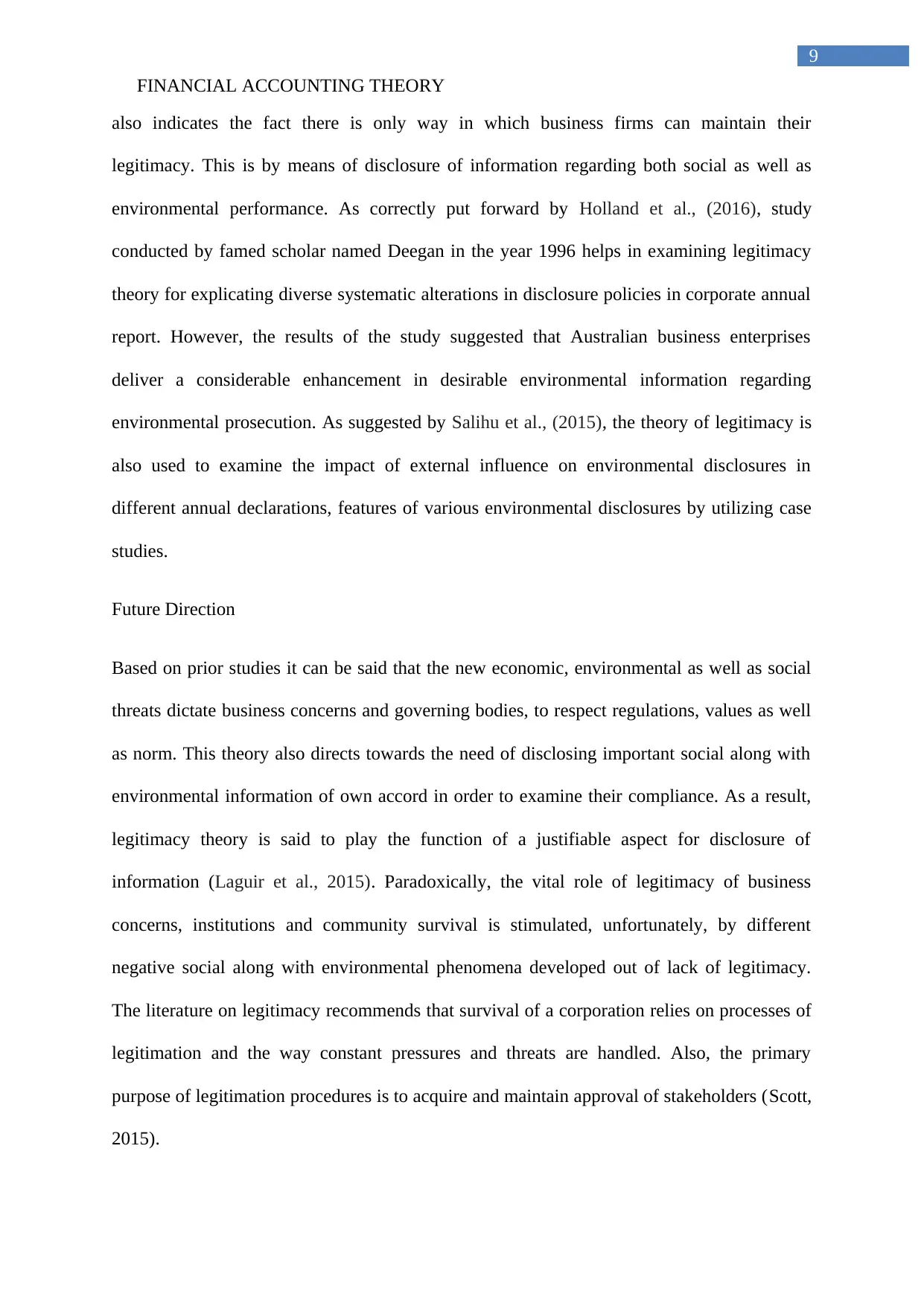
9
FINANCIAL ACCOUNTING THEORY
also indicates the fact there is only way in which business firms can maintain their
legitimacy. This is by means of disclosure of information regarding both social as well as
environmental performance. As correctly put forward by Holland et al., (2016), study
conducted by famed scholar named Deegan in the year 1996 helps in examining legitimacy
theory for explicating diverse systematic alterations in disclosure policies in corporate annual
report. However, the results of the study suggested that Australian business enterprises
deliver a considerable enhancement in desirable environmental information regarding
environmental prosecution. As suggested by Salihu et al., (2015), the theory of legitimacy is
also used to examine the impact of external influence on environmental disclosures in
different annual declarations, features of various environmental disclosures by utilizing case
studies.
Future Direction
Based on prior studies it can be said that the new economic, environmental as well as social
threats dictate business concerns and governing bodies, to respect regulations, values as well
as norm. This theory also directs towards the need of disclosing important social along with
environmental information of own accord in order to examine their compliance. As a result,
legitimacy theory is said to play the function of a justifiable aspect for disclosure of
information (Laguir et al., 2015). Paradoxically, the vital role of legitimacy of business
concerns, institutions and community survival is stimulated, unfortunately, by different
negative social along with environmental phenomena developed out of lack of legitimacy.
The literature on legitimacy recommends that survival of a corporation relies on processes of
legitimation and the way constant pressures and threats are handled. Also, the primary
purpose of legitimation procedures is to acquire and maintain approval of stakeholders (Scott,
2015).
FINANCIAL ACCOUNTING THEORY
also indicates the fact there is only way in which business firms can maintain their
legitimacy. This is by means of disclosure of information regarding both social as well as
environmental performance. As correctly put forward by Holland et al., (2016), study
conducted by famed scholar named Deegan in the year 1996 helps in examining legitimacy
theory for explicating diverse systematic alterations in disclosure policies in corporate annual
report. However, the results of the study suggested that Australian business enterprises
deliver a considerable enhancement in desirable environmental information regarding
environmental prosecution. As suggested by Salihu et al., (2015), the theory of legitimacy is
also used to examine the impact of external influence on environmental disclosures in
different annual declarations, features of various environmental disclosures by utilizing case
studies.
Future Direction
Based on prior studies it can be said that the new economic, environmental as well as social
threats dictate business concerns and governing bodies, to respect regulations, values as well
as norm. This theory also directs towards the need of disclosing important social along with
environmental information of own accord in order to examine their compliance. As a result,
legitimacy theory is said to play the function of a justifiable aspect for disclosure of
information (Laguir et al., 2015). Paradoxically, the vital role of legitimacy of business
concerns, institutions and community survival is stimulated, unfortunately, by different
negative social along with environmental phenomena developed out of lack of legitimacy.
The literature on legitimacy recommends that survival of a corporation relies on processes of
legitimation and the way constant pressures and threats are handled. Also, the primary
purpose of legitimation procedures is to acquire and maintain approval of stakeholders (Scott,
2015).
⊘ This is a preview!⊘
Do you want full access?
Subscribe today to unlock all pages.

Trusted by 1+ million students worldwide
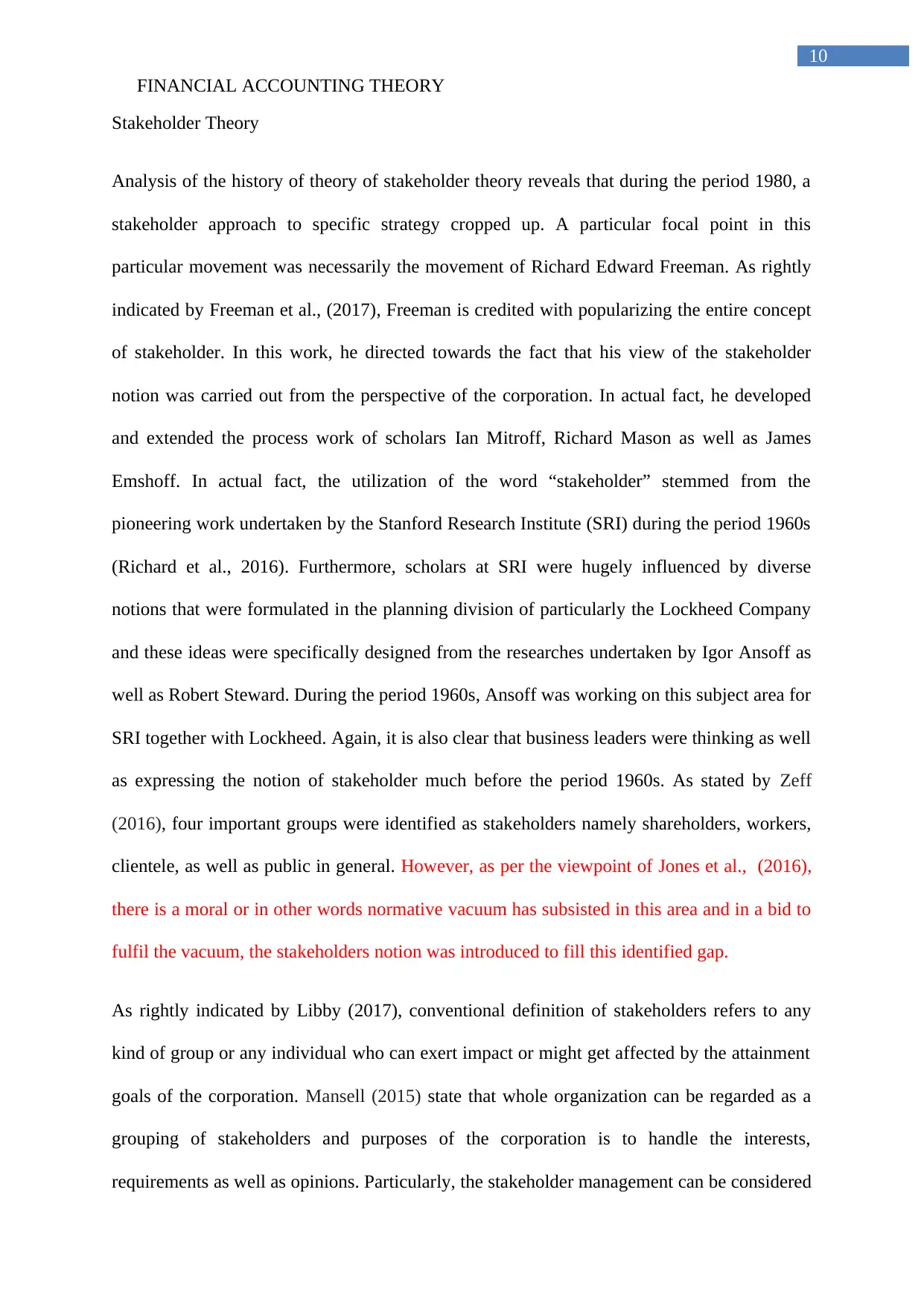
10
FINANCIAL ACCOUNTING THEORY
Stakeholder Theory
Analysis of the history of theory of stakeholder theory reveals that during the period 1980, a
stakeholder approach to specific strategy cropped up. A particular focal point in this
particular movement was necessarily the movement of Richard Edward Freeman. As rightly
indicated by Freeman et al., (2017), Freeman is credited with popularizing the entire concept
of stakeholder. In this work, he directed towards the fact that his view of the stakeholder
notion was carried out from the perspective of the corporation. In actual fact, he developed
and extended the process work of scholars Ian Mitroff, Richard Mason as well as James
Emshoff. In actual fact, the utilization of the word “stakeholder” stemmed from the
pioneering work undertaken by the Stanford Research Institute (SRI) during the period 1960s
(Richard et al., 2016). Furthermore, scholars at SRI were hugely influenced by diverse
notions that were formulated in the planning division of particularly the Lockheed Company
and these ideas were specifically designed from the researches undertaken by Igor Ansoff as
well as Robert Steward. During the period 1960s, Ansoff was working on this subject area for
SRI together with Lockheed. Again, it is also clear that business leaders were thinking as well
as expressing the notion of stakeholder much before the period 1960s. As stated by Zeff
(2016), four important groups were identified as stakeholders namely shareholders, workers,
clientele, as well as public in general. However, as per the viewpoint of Jones et al., (2016),
there is a moral or in other words normative vacuum has subsisted in this area and in a bid to
fulfil the vacuum, the stakeholders notion was introduced to fill this identified gap.
As rightly indicated by Libby (2017), conventional definition of stakeholders refers to any
kind of group or any individual who can exert impact or might get affected by the attainment
goals of the corporation. Mansell (2015) state that whole organization can be regarded as a
grouping of stakeholders and purposes of the corporation is to handle the interests,
requirements as well as opinions. Particularly, the stakeholder management can be considered
FINANCIAL ACCOUNTING THEORY
Stakeholder Theory
Analysis of the history of theory of stakeholder theory reveals that during the period 1980, a
stakeholder approach to specific strategy cropped up. A particular focal point in this
particular movement was necessarily the movement of Richard Edward Freeman. As rightly
indicated by Freeman et al., (2017), Freeman is credited with popularizing the entire concept
of stakeholder. In this work, he directed towards the fact that his view of the stakeholder
notion was carried out from the perspective of the corporation. In actual fact, he developed
and extended the process work of scholars Ian Mitroff, Richard Mason as well as James
Emshoff. In actual fact, the utilization of the word “stakeholder” stemmed from the
pioneering work undertaken by the Stanford Research Institute (SRI) during the period 1960s
(Richard et al., 2016). Furthermore, scholars at SRI were hugely influenced by diverse
notions that were formulated in the planning division of particularly the Lockheed Company
and these ideas were specifically designed from the researches undertaken by Igor Ansoff as
well as Robert Steward. During the period 1960s, Ansoff was working on this subject area for
SRI together with Lockheed. Again, it is also clear that business leaders were thinking as well
as expressing the notion of stakeholder much before the period 1960s. As stated by Zeff
(2016), four important groups were identified as stakeholders namely shareholders, workers,
clientele, as well as public in general. However, as per the viewpoint of Jones et al., (2016),
there is a moral or in other words normative vacuum has subsisted in this area and in a bid to
fulfil the vacuum, the stakeholders notion was introduced to fill this identified gap.
As rightly indicated by Libby (2017), conventional definition of stakeholders refers to any
kind of group or any individual who can exert impact or might get affected by the attainment
goals of the corporation. Mansell (2015) state that whole organization can be regarded as a
grouping of stakeholders and purposes of the corporation is to handle the interests,
requirements as well as opinions. Particularly, the stakeholder management can be considered
Paraphrase This Document
Need a fresh take? Get an instant paraphrase of this document with our AI Paraphraser
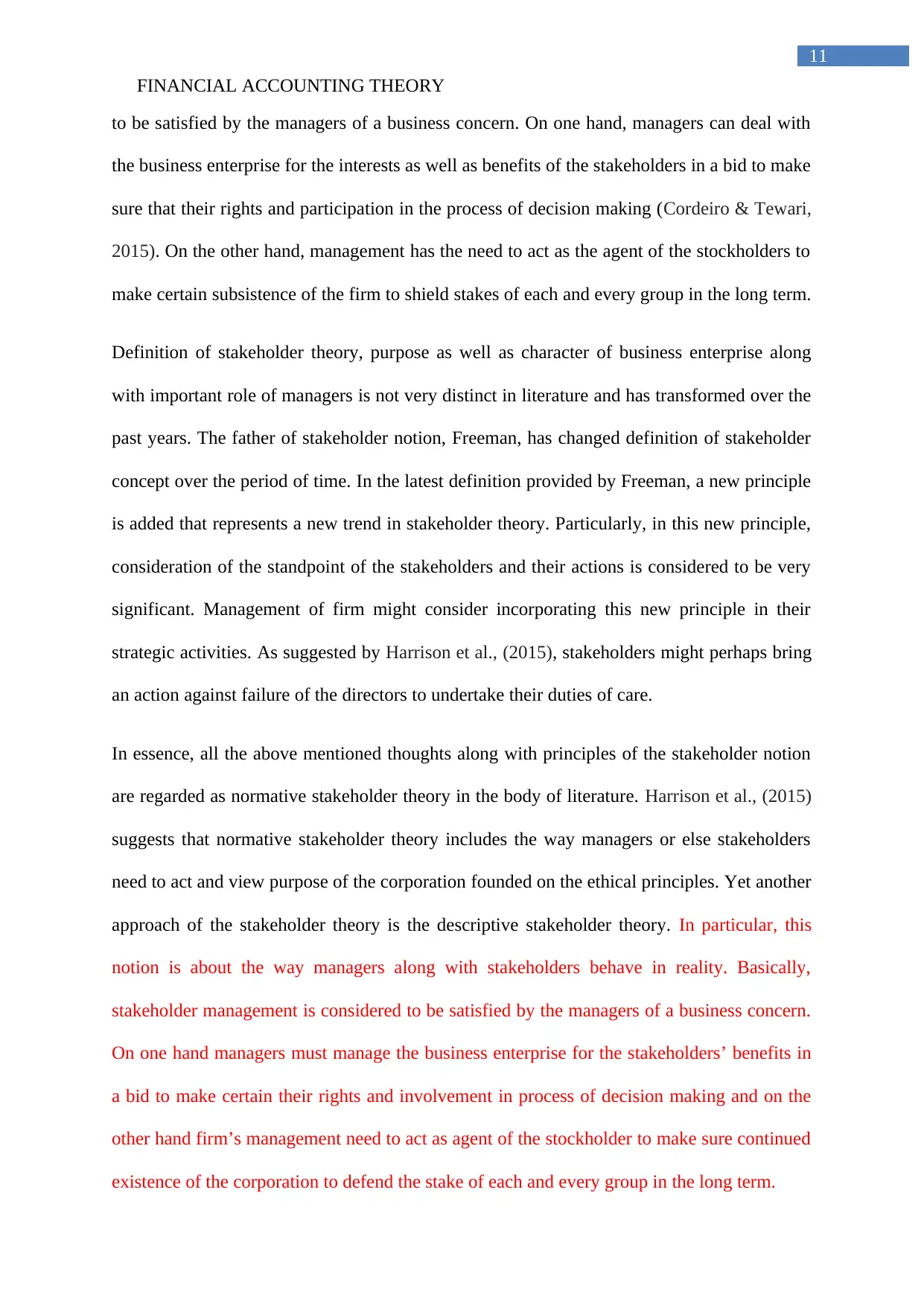
11
FINANCIAL ACCOUNTING THEORY
to be satisfied by the managers of a business concern. On one hand, managers can deal with
the business enterprise for the interests as well as benefits of the stakeholders in a bid to make
sure that their rights and participation in the process of decision making (Cordeiro & Tewari,
2015). On the other hand, management has the need to act as the agent of the stockholders to
make certain subsistence of the firm to shield stakes of each and every group in the long term.
Definition of stakeholder theory, purpose as well as character of business enterprise along
with important role of managers is not very distinct in literature and has transformed over the
past years. The father of stakeholder notion, Freeman, has changed definition of stakeholder
concept over the period of time. In the latest definition provided by Freeman, a new principle
is added that represents a new trend in stakeholder theory. Particularly, in this new principle,
consideration of the standpoint of the stakeholders and their actions is considered to be very
significant. Management of firm might consider incorporating this new principle in their
strategic activities. As suggested by Harrison et al., (2015), stakeholders might perhaps bring
an action against failure of the directors to undertake their duties of care.
In essence, all the above mentioned thoughts along with principles of the stakeholder notion
are regarded as normative stakeholder theory in the body of literature. Harrison et al., (2015)
suggests that normative stakeholder theory includes the way managers or else stakeholders
need to act and view purpose of the corporation founded on the ethical principles. Yet another
approach of the stakeholder theory is the descriptive stakeholder theory. In particular, this
notion is about the way managers along with stakeholders behave in reality. Basically,
stakeholder management is considered to be satisfied by the managers of a business concern.
On one hand managers must manage the business enterprise for the stakeholders’ benefits in
a bid to make certain their rights and involvement in process of decision making and on the
other hand firm’s management need to act as agent of the stockholder to make sure continued
existence of the corporation to defend the stake of each and every group in the long term.
FINANCIAL ACCOUNTING THEORY
to be satisfied by the managers of a business concern. On one hand, managers can deal with
the business enterprise for the interests as well as benefits of the stakeholders in a bid to make
sure that their rights and participation in the process of decision making (Cordeiro & Tewari,
2015). On the other hand, management has the need to act as the agent of the stockholders to
make certain subsistence of the firm to shield stakes of each and every group in the long term.
Definition of stakeholder theory, purpose as well as character of business enterprise along
with important role of managers is not very distinct in literature and has transformed over the
past years. The father of stakeholder notion, Freeman, has changed definition of stakeholder
concept over the period of time. In the latest definition provided by Freeman, a new principle
is added that represents a new trend in stakeholder theory. Particularly, in this new principle,
consideration of the standpoint of the stakeholders and their actions is considered to be very
significant. Management of firm might consider incorporating this new principle in their
strategic activities. As suggested by Harrison et al., (2015), stakeholders might perhaps bring
an action against failure of the directors to undertake their duties of care.
In essence, all the above mentioned thoughts along with principles of the stakeholder notion
are regarded as normative stakeholder theory in the body of literature. Harrison et al., (2015)
suggests that normative stakeholder theory includes the way managers or else stakeholders
need to act and view purpose of the corporation founded on the ethical principles. Yet another
approach of the stakeholder theory is the descriptive stakeholder theory. In particular, this
notion is about the way managers along with stakeholders behave in reality. Basically,
stakeholder management is considered to be satisfied by the managers of a business concern.
On one hand managers must manage the business enterprise for the stakeholders’ benefits in
a bid to make certain their rights and involvement in process of decision making and on the
other hand firm’s management need to act as agent of the stockholder to make sure continued
existence of the corporation to defend the stake of each and every group in the long term.
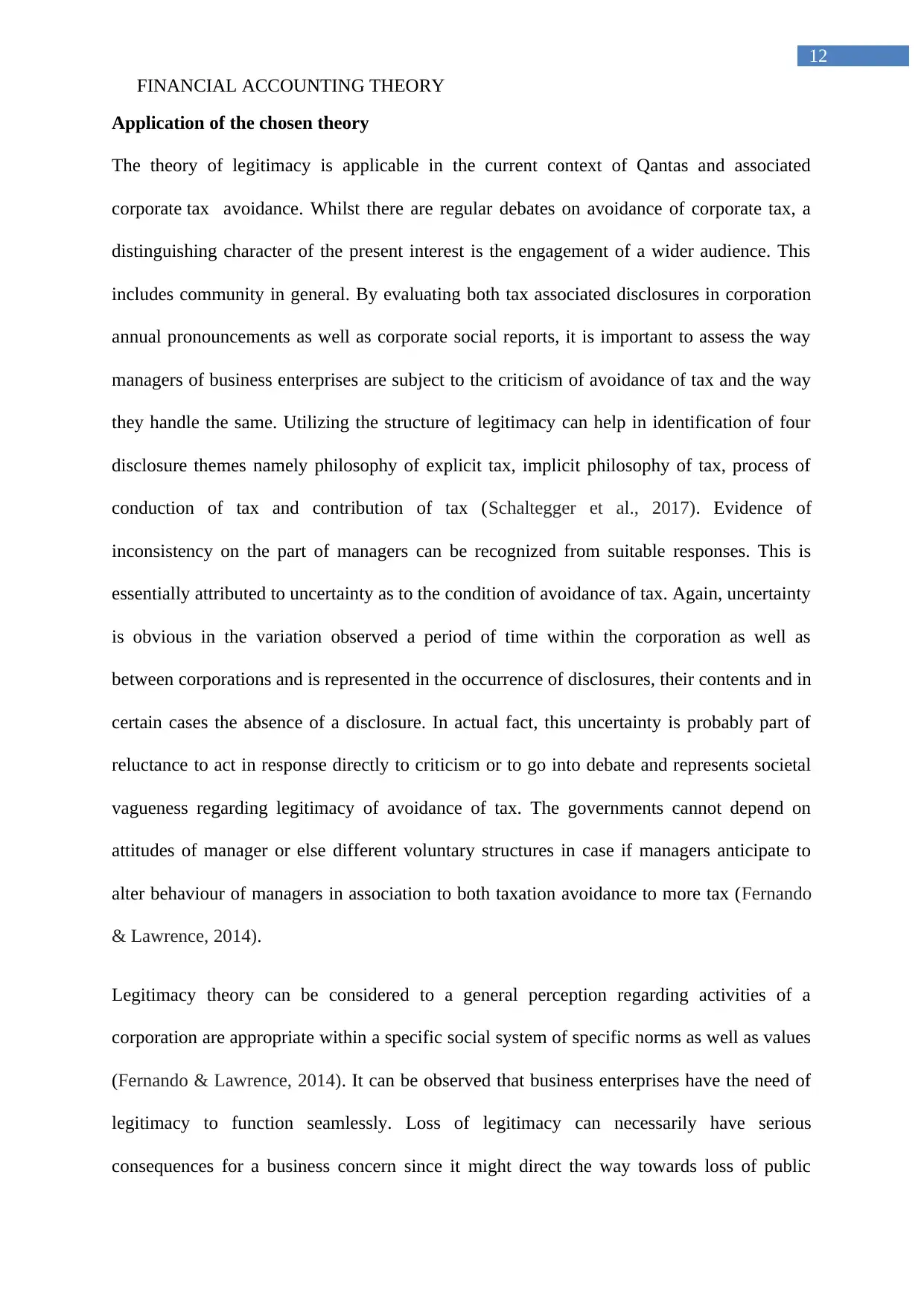
12
FINANCIAL ACCOUNTING THEORY
Application of the chosen theory
The theory of legitimacy is applicable in the current context of Qantas and associated
corporate tax avoidance. Whilst there are regular debates on avoidance of corporate tax, a
distinguishing character of the present interest is the engagement of a wider audience. This
includes community in general. By evaluating both tax associated disclosures in corporation
annual pronouncements as well as corporate social reports, it is important to assess the way
managers of business enterprises are subject to the criticism of avoidance of tax and the way
they handle the same. Utilizing the structure of legitimacy can help in identification of four
disclosure themes namely philosophy of explicit tax, implicit philosophy of tax, process of
conduction of tax and contribution of tax (Schaltegger et al., 2017). Evidence of
inconsistency on the part of managers can be recognized from suitable responses. This is
essentially attributed to uncertainty as to the condition of avoidance of tax. Again, uncertainty
is obvious in the variation observed a period of time within the corporation as well as
between corporations and is represented in the occurrence of disclosures, their contents and in
certain cases the absence of a disclosure. In actual fact, this uncertainty is probably part of
reluctance to act in response directly to criticism or to go into debate and represents societal
vagueness regarding legitimacy of avoidance of tax. The governments cannot depend on
attitudes of manager or else different voluntary structures in case if managers anticipate to
alter behaviour of managers in association to both taxation avoidance to more tax (Fernando
& Lawrence, 2014).
Legitimacy theory can be considered to a general perception regarding activities of a
corporation are appropriate within a specific social system of specific norms as well as values
(Fernando & Lawrence, 2014). It can be observed that business enterprises have the need of
legitimacy to function seamlessly. Loss of legitimacy can necessarily have serious
consequences for a business concern since it might direct the way towards loss of public
FINANCIAL ACCOUNTING THEORY
Application of the chosen theory
The theory of legitimacy is applicable in the current context of Qantas and associated
corporate tax avoidance. Whilst there are regular debates on avoidance of corporate tax, a
distinguishing character of the present interest is the engagement of a wider audience. This
includes community in general. By evaluating both tax associated disclosures in corporation
annual pronouncements as well as corporate social reports, it is important to assess the way
managers of business enterprises are subject to the criticism of avoidance of tax and the way
they handle the same. Utilizing the structure of legitimacy can help in identification of four
disclosure themes namely philosophy of explicit tax, implicit philosophy of tax, process of
conduction of tax and contribution of tax (Schaltegger et al., 2017). Evidence of
inconsistency on the part of managers can be recognized from suitable responses. This is
essentially attributed to uncertainty as to the condition of avoidance of tax. Again, uncertainty
is obvious in the variation observed a period of time within the corporation as well as
between corporations and is represented in the occurrence of disclosures, their contents and in
certain cases the absence of a disclosure. In actual fact, this uncertainty is probably part of
reluctance to act in response directly to criticism or to go into debate and represents societal
vagueness regarding legitimacy of avoidance of tax. The governments cannot depend on
attitudes of manager or else different voluntary structures in case if managers anticipate to
alter behaviour of managers in association to both taxation avoidance to more tax (Fernando
& Lawrence, 2014).
Legitimacy theory can be considered to a general perception regarding activities of a
corporation are appropriate within a specific social system of specific norms as well as values
(Fernando & Lawrence, 2014). It can be observed that business enterprises have the need of
legitimacy to function seamlessly. Loss of legitimacy can necessarily have serious
consequences for a business concern since it might direct the way towards loss of public
⊘ This is a preview!⊘
Do you want full access?
Subscribe today to unlock all pages.

Trusted by 1+ million students worldwide
1 out of 19
Your All-in-One AI-Powered Toolkit for Academic Success.
+13062052269
info@desklib.com
Available 24*7 on WhatsApp / Email
![[object Object]](/_next/static/media/star-bottom.7253800d.svg)
Unlock your academic potential
Copyright © 2020–2026 A2Z Services. All Rights Reserved. Developed and managed by ZUCOL.

